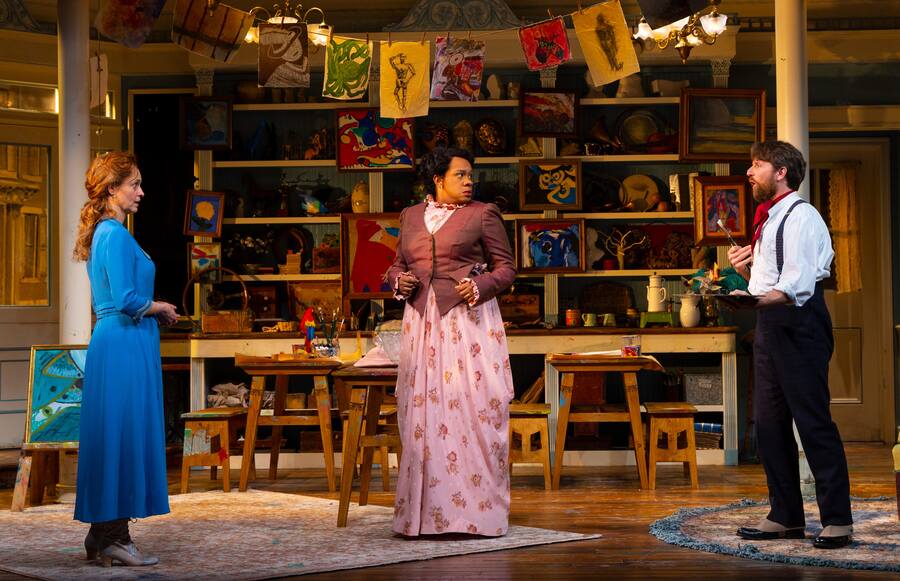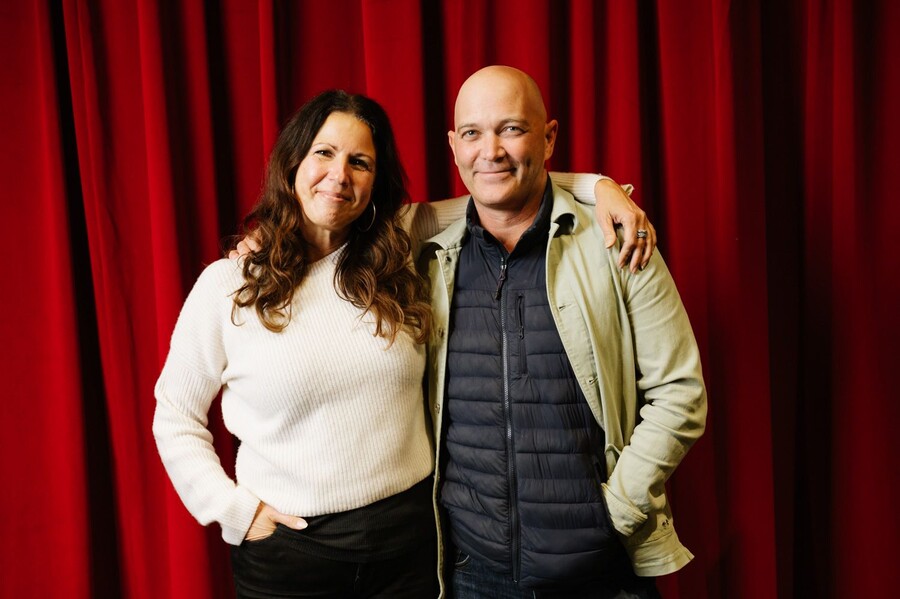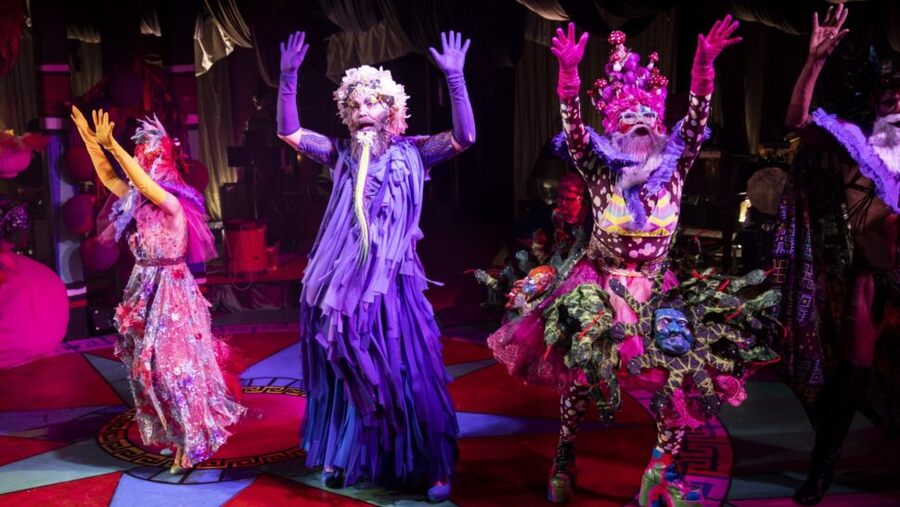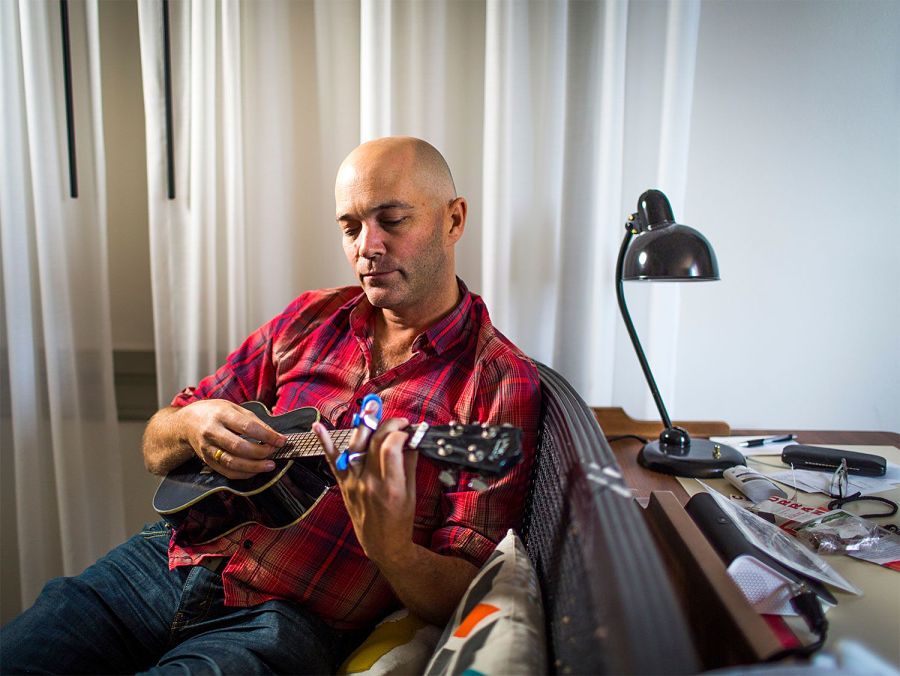Since Taylor Mac first appeared on the cover of American Theatre in November 2008, judy’s career has skyrocketed, from their breakthrough play Hir to their Tony-nominated play Gary, as well as the marathon performance of A 24-Decade History of Popular Music, and numerous nominations and awards.
Mac recently sat down to chat about Joy and Pandemic, currently running at the Huntington Theatre Company in Boston. This new play features a cast of actors, with Mac offstage in the role of playwright, and was inspired by their late mother’s art school in Stockton, Calif., though it’s set in Philadelphia during the flu epidemic of 1918, in part as a reflection of our current moment.
In this conversation, Mac also ruminates on theatre, politics, playwriting, forgiveness, New York, and nature.
SEAN F. EDGECOMB: Are you in Boston?
TAYLOR MAC: Yes, I’m here until May 3, when Joy and Pandemic opens.
How has this experience been?
I have really been appreciating my time in Boston. I’d never spent that much time in the South End while I was here. It’s so beautiful, all the cobblestone streets and the old townhouses. Boston has always felt so corporate to me—all, like, Panera and stuff; that’s all I had experienced of it. But that’s not the case this time. I’m quite appreciating it.
With Joy and Pandemic being a period piece, has the atmosphere of the South End and the history of Boston informed the production in any way?
Yes. I hadn’t thought about that, but probably the strangest element is that we were originally going to do the play in San Francisco. It’s set in Philadelphia, it’s not set in Boston, but it has a lot to do with Christian Science, and the Christian Science Mother Church is in Boston. It’s a big complex; there’s a park and a reflecting pool and everyone hangs out there. It’s like a community space more than it is a religious institution at this point. But it’s very present. They own a lot of real estate in town. The theatre put me up in this residency that is smack dab—just as a coincidence—across the street from the Mother Church. The thing I’m looking at right now is the Mother Church. It’s so strange. I keep saying, I think God wanted the critique.

Many years ago, when we were talking about your play The Young Ladies of, which is about personal grief around your dad’s death, you mentioned that you like to use playwriting as a form of therapy
[Laughing] I don’t know. Now that I’m in therapy, I don’t think that’s true.
Ha! Well, I was wondering how Joy and Pandemic related to the passing of your mother, Joy?
I think as an artist, but I tend to wonder about something for some important reason as it connects to my well-being to get it up to write about it. I have to be inspired to not necessarily solve a problem in my life, but to make something tangible to be able to look at it and say, okay, what is this I’m dealing with? I find songwriting, playwriting, all the performance art pieces that I make connected to those questions. Like in A 24-Decade History of Popular Music: I don’t understand what it means to be a queer person in America, so I make a show that helps me understand this history and helps me understand and puts a queer person at the center of the consideration of the United States. You know, it’s just me trying to understand the world. That’s why I write. Joy and Pandemic is my way of understanding how I grew up and how it is in relation to a lot of things that America is dealing with, and that I grew up in America dealing with—white supremacy, and this kind of insertion into the culture that belief is more important than reality.
I have such a visceral memory of the marathon performance of A 24-Decade History at St. Ann’s Warehouse in October 2016. At the time, I felt so hopeful. I was sure that Hillary Clinton was going to be elected president. Then a month later things seemed to crash and burn. And now things are so crazy, particularly around the theft of agency for oppressed people and queer people and trans people. As cultural context has changed, do you think that your work has changed over the past seven or eight years?
I mean, one thing you learn when making a show that focuses in on a certain kind of history of the United States is the old Mark Twain quote, “History doesn’t repeat itself, but it rhymes.” I don’t see this as any different from when Bush was trying to get elected. Republicans were using gays as the reason to rally the base, and being anti-homosexual was the reason. Now they’re anti-trans and anti-drag. It’s not going to work for them in the long run, but it could very well work for them right now. A lot of people suffer as a result. It’s a sad thing, but I don’t know—I don’t think the work really has changed.
I thought Hillary Clinton was going to win the election. I was kind of foolish, like many people, but I wasn’t foolish to the degree that I thought that was going to solve all our problems. It was just a fun little moment of like, yay, maybe we’re making an inch towards something a little bit better, more equitable, and more conscious. Just a little inch, and that is a great thing to celebrate in the United States, which always feels like it’s one step forward, three steps back.
Back…forward…side to side. That’s queer, right? We know that time is not linear. And maybe, when seen from a queer perspective, time bounces all over the place? I’ve been finding some comfort in an older generation of queer people saying, “You didn’t live through Reagan—you have no idea. We’ve been dealing with this for a long time.”
Right. It’s just more of the same. The rhetoric seems to be more intense and the hyperbole is more intense, the language is more crass and the adrenaline seems bigger to me than when I was younger. But, you know, it’s part of the problem with the world.

Going back to Joy and Pandemic. Can you speak a bit more about the inspiration for the play—how it relates to your own story, and what it means to see this world created onstage?
My mom ran an art school for kids when I was growing up in California. It was a private school that she created with my stepfather at the time. It was this place that I hated going to, but it was very visually stimulating, you know, and there was lots of artwork all over the place. I mean, she was responsible for thousands of works of art, because she ran it for 30 years with 40 kids a class and six classes a week. They were all making art, making art, making art. I wrote this play set in my mom’s art school, but I set it in 1918 to give myself a little remove from it, and also because I am fascinated by that period of time. And coincidentally the Spanish flu and this pandemic—it all started to kind of just make sense for that period.
Arnulfo Maldonado is our scenic designer—he also designed A Strange Loop—and he made this the most beautiful set. And when I walked into the space and I saw what Arnulfo had done…it’s just so beautiful. I realized that I needed to see my mother’s school from a different place, and this is what art can do: It can bring you closer to your meditation on forgiveness. I see a whole different side of my mom than I could have when I was younger; I couldn’t see it when I was in it. But now I’m older. And then somebody takes my writing about it, puts it in a different time, and then adds their vision to it, and suddenly I can see it and I can understand what she was trying to do with this school. It’s very moving for me. I find it very useful. I find it cathartic.
Before our chat, I was thinking about your past year, starting with the premiere of The Hang at HERE Arts Center in Manhattan, which was amazing and had a great run. Then you add in all of your new work, like Joy and Bark of Millions and the continuation of A 24-Decade History, and I’m amazed by your hyper-productivity. When people ask me about you, I always say you’re one of the hardest-working people I know. How do you do it? Where does that drive come from?
Mental illness. I mean, I’m joking about it being a mental illness, but I’m not totally sure it’s not. What I can say is I love writing. I just do. The thing that makes me happier than maybe anything is putting my hand in my husband’s hand. There’s something about the way his hand feels that I just like. And then the other thing is writing. I just love it. And it doesn’t come with complications until you bring the other people into it. Of course, you want to share, and you want to grow and change and be something else. I just love the process of writing. I want to dig in and talk about all the ideas.
My first playwriting mentor was Michael Warren Powell, who was Lanford Wilson’s husband and ran the Circle Rep Lab for many years. He took me through my first play that I wrote. He went beat by beat and we talked about every single beat. And when I talk about a beat, I’m talking about like five lines, not a scene or anything. We talked about every single beat in the play extensively. He spoiled me. I’ve had a little bit with my friend Nina Mankin, who’s a dramaturg; she’s done that with me. But other than Michael and Nina, I really haven’t had that again. It was just the greatest thing ever. It’s the greatest gift to just be able to dig into every single little beat.
Is your writing process distinctly different from your process as a performer? I think of you as being so collaborative, especially with music director Matt Ray or costume designer Machine Dazzle.
My process with them is so different from anything else I’ve experienced in the American theatre. I don’t tell Machine what to make; I just say, This is kind of the circumstance; this is the script, or just lyrics, or just stage directions. Sometimes Machine doesn’t know what the script is; sometimes he just knows an idea. And I just let him make, and then I’m aware of whatever he makes. I don’t tell him how to change the work; I don’t want him to tell me how to rewrite my work, so I don’t tell him how to rewrite his costumes. That’s very rare in the American theatre, because most often the concept of being a director or a lead artist is that you’re shaping everybody else’s work to make it work for the whole. My happy place is when everybody’s work is so different, but it fits together because the theme says, fit together. You don’t have to do anything, because if everyone was told the theme, and they work off that theme, then there’s a heterogeneous expression from many different people rather than trying to wrangle everybody’s stuff into a very clear vision. I just prefer that model for certain kinds of work.

Then there’s other work that’s a little harder to work that way, to be honest. Like playwriting. If it’s a play, it’s just a little harder to accept the smorgasbord approach. But I’m trying to get there. I don’t know how to do it yet, but I’m trying to figure it out, because I love working that way. It makes everybody happier. Nobody likes being told what to do…I mean, some people do.
It’s hard to believe, but I think I first interviewed you over 15 years ago. I’ve worked my way up through the ranks in academia, always writing about your work, while your career has skyrocketed to the point of celebrity. Is today’s Taylor Mac the same Taylor Mac from the early part of your career when you were still performing in East Village dive bars?
Yeah, I’m just me. I don’t want to be an idea on the stage. To some degree, you can’t help but be an idea on a stage. But I am trying to find my way out of being an idea. I’ve got nothing to complain about, things are great—but it’s very hard for me to get a single Off-Broadway theatre in New York City to produce my work. You can say like, “Ah, you’re so successful,” but it’s capitalism yet again. It’s the industry. It’s homophobia—that is a part of it. It’s that we’re not able to create models that invite people to bring their best to the world. We have to make it ourselves, which always means there’s a certain benefit to that, and a certain kind of diminishment at the same time. That’s a long way to say that I still feel kind of like a dork on a stage trying to figure things out. Like, I don’t feel confident ever.
I didn’t know that. I always describe you as someone who was born to be on the stage.
Oh, I feel very confident being on a stage. I know that’s my water. I’m a fish, that’s my water. But that doesn’t mean that I’m always secure. Confident, I think, is maybe different from secure. I have confidence that I can do something on a stage that is going to be interesting. I don’t always have confidence that I can do something on the stage that is going to satisfy me.
Well, I’ve always thought of you as a star and finally the world seems to be catching up. You’ve been nominated for the Pulitzer and for a Tony. You’ve been a MacArthur Genius, then you were on the stage with the Queen of Norway accepting the Ibsen Award. This June a documentary on A 24-Decade History by Rob Epstein and Jeffrey Friedman will premiere at the Tribeca Film Festival, and University of Michigan Press just published The Taylor Mac Book: Ritual, Realness and Radical Performance, co-edited by David Román and myself. Considering that you are still young enough to have a long way to go in your career, is it strange to be garnering all of this attention about your career?
I’ve done a lot. I feel kind of old. Sometimes people ask me to write a memoir or something like that, pushing for me to do that. And I’m like, talk to me in 20 years; I’m not quite ready to do that yet. I’ve written a lot of work and I hope there continues to be more real critical response to the work, as opposed to journalistic critical response—real analysis. That’s what I’m always longing for.
You deserve it. Are you still spending a lot of time in the Berkshires?
That’s where I live now. I come to the city on a weekly basis to do lots of things. But I live in the Berkshires now. I had this weird feeling of not being a New Yorker anymore, and then I just thought, “Oh God, it’s so useless.” That weird, dumb New York pride, or Berkshires pride, all of that stuff is so useless to me. It doesn’t help. So yeah, I hang out where I can put my hand in my husband’s hand. That’s where I want to primarily be.
I love that. We’re in rural Connecticut permanently now. It just happened. I figure I’ll always be a New Yorker—I know New York and I’ll always love New York, but it was time for a transition.
Yeah, I appreciate it when I’m back every week. When I get off the train, I’m so happy to be there. It’s exciting, and I like seeing my friends and I don’t feel like I get exhausted by it. And then I go away.
Maybe New York in small doses is the way to consume it?
I feel very similarly. I think it’s decades of being onstage and having speakers blaring at my ears. I just can’t handle the constant construction [work in the city]. It’s really come down to that. Ear fatigue is a real thing. It irritates me to be around a lot of loud noises, and New York is louder and louder and louder. I figured out how to make it fun. And that’s the key to life.
It is the key to life. During the COVID shutdown I decamped to Connecticut, and I remembered, as someone who grew up on a rural farm, that being in nature is so grounding to me.
It’s shocking how we forget. Why would we ever forget that we are nature? Nature is everything.
Sean F. Edgecomb will take over the role of resident director of theatre and associate professor at Fairfield University in September, following eight years at the CUNY Graduate Center and CSI. He recently co-edited The Taylor Mac Book with David Román, published by University of Michigan Press.


